The University has issued an apology for incorrectly claiming that Stanford was not aware of a multi-year fraud case against a prominent genetics professor who paid $29.2 million in damages. The apology came after The Daily inquired about inconsistencies between the University’s initial statement and court records.
Genetics professor Stan Cohen was found liable for “negligent misrepresentation” and “deceit” in a June 25 ruling after he misled investors into his biotechnology company Nuredis and hid his drug’s prior history of death and loss of limbs.
The University has been aware of this case for years, but Stanford has repeatedly declined to say whether it will respond to the incident. University spokesperson Dee Mostofi wrote in December, “Activity related to Nuredis would have been outside of Professor Cohen’s responsibilities at Stanford.” The University’s spokespeople have also declined to comment in response to repeated inquiries from The Daily by phone and email on how fraud is addressed at Stanford, what the methods for addressing faculty misconduct look like and whether Cohen will remain employed at the school.
Initially, when contacted by The Daily in December, Mostofi claimed, “The university was not aware of this lawsuit and was never a party to it.” Cecilia Arradaza, a spokesperson for the School of Medicine, also said the University was not aware of the lawsuit and declined to answer The Daily’s questions about Cohen and any potential ramifications against the professor on this basis.
However, court documents show that Stanford was subpoenaed in the case early on in the 2018 suit and, after serving a formal objection to the subpoena, ultimately provided numerous documents and witnesses who testified by deposition.
In response to additional questions from The Daily, spokesperson Luisa Rapport confirmed Friday that the University had, indeed, known about the case.
She “apologize[d] for the error” and wrote that “the university does respond to many subpoenas related to lawsuits in which Stanford is not a party.” She declined to comment on questions about why the false statement had been issued.
Cohen himself has not commented publicly since The Daily first reported his legal battles. The world-renowned geneticist denied allegations of wrongdoing over the course of the trial but did admit to providing false testimony while under oath. His claim that he had found a possible “cure” for Huntington’s disease, a fatal neurodegenerative disease, involved research performed at Stanford and intellectual property that the school now owns.
“The institution works mightily to publicize the great and gloried activities of its faculty (and students), even while it works at least as vigorously to avoid and ignore [less savory activities]” wrote one senior scientist in the School of Medicine, who requested anonymity to speak freely about a decades-long colleague.
